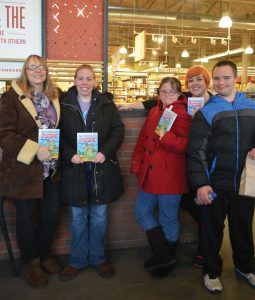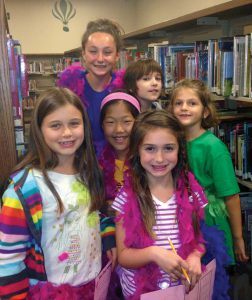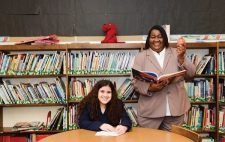When Kristin Campbell, 23, has trouble with a word, she glances up over the rim of her pink glasses, and librarian Deena Caswell helps her out with pronunciation. Campbell comes to the end of a paragraph, and without missing a beat Crystal Worthington, 32, picks up where Campbell left off.

The Next Chapter Book Club of Cherry Hill meets each week at a local supermarket
This is the Next Chapter Book Club, a group of adults with developmental disabilities who meets each week in the café area of the Cherry Hill Whole Foods to read aloud. What was once a pastime for suburban moms, book clubs have expanded and transformed in the most non-traditional ways. And those one-of-a-kind book clubs are flourishing across SJ.
The Cherry Hill-based group is reading “The Adventures of Tom Sawyer,” and Worthington says that although the book is a classic, she’d never heard of it until Linda Tilden, the Cherry Hill Public Library reference librarian who spearheads the group, suggested it as their next title.
“I understand now why it’s a classic,” Worthington says. “Younger generations will like it, even though it was written a long time ago. It’s nice that you can read things like Tom Sawyer and then go tell younger people about it, and they’ll like it too.”
Tilden and Caswell launched Cherry Hill’s chapter of the Next Chapter Book Club last September, with guidance from the founders of the first New Jersey chapter at the Scotch Plains Library. (The national club boasts 250 chapters in 29 states, four Canadian provinces, three European countries and Israel.) The program’s mission is to provide social andeducational engagement for people who may not have those opportunities elsewhere.
“After people with special needs age out of the school system, there’s really not a lot of opportunity to read,” Tilden says. “Reading as a group, especially, is something there’s not a lot of access to. It’s also a chance for them to chat and socialize, and talk about what’s going on in their lives. Plus, we’re out in a public place and that in itself is a good thing.”
The five regular attendees range in age from 20 to 37 and have varying reading abilities.
“We go around and everyone reads something,” Tilden says. “We have skilled readers and people who are more hesitant, but everyone in the group is very accepting of everyone else. There’s no embarrassment, and no one cares if someone needs help.”
Toni Slowinski, whose son Stefan, 20, is a member of the Cherry Hill group, says she was thrilled when Next Chapter came to SJ.
“I first heard about it years ago, when someone in our support group gave me a book about it,” Slowinski says. “I thought it was such a great idea because reading is so fundamental – we all need to read.”
Stefan says “The Adventures of Tom Sawyer” is his favorite book the group has read so far. He likes the protagonist’s bold, carefree attitude, and when it’s his turn to read, Stefan will often stop mid-sentence to chuckle at Tom’s antics.
Stefan also enjoys the humorous poetry, by Shel Silverstein or Jack Prelutsky, that Tilden and Caswell have begun introducing at the start of the meetings. He’s excited to finish Tom Sawyer and move on to the next book, but what really keeps him coming back is simple.
“My favorite part,” he says with a wry smile, “is the snacks.”
The philosophy of the Next Chapter Book Club calls for small groups – ideally no more than eight readers – to ensure that everyone gets a chance to read and participate. Tilden worked with a librarian at the Voorhees branch of the Camden County Library to provide even more opportunities for interested members.
The club’s Voorhees chapter meets at the M. Allan Vogelson library in the evening.
The Next Chapter Book Club caters specifically to adults, as did every other book club Moorestown’s Amanda Cooper had been able to find. That was a problem, because when Amanda was 10 years old, she wanted to join a book club.
“My mom was attending book clubs all the time,” says the Moorestown Friends School freshman. “I’d see her hosting clubs and reading books, and it looked like so much fun. I asked her if I could be in a book club.”

Amanda Cooper encourages young girls to have fun while reading
Not knowing of any book clubs for young girls, Amanda set out to share her love of independent reading with other girls in her town. With the support of the Moorestown Library, she started Girls Love to Read, a book club for girls in first through third grades.
“The first book I chose was ‘Fancy Nancy, Super Sleuth’ by Jane O’Connor,” Amanda says. “I thought it would be a good book to introduce girls to the idea that reading can be so much fun.”
The book centers on Nancy, a girl detective who wears glamorous clothes and accessories. To get the book club in the reading spirit, Amanda brought feather boas and sparkly costume jewelry.
For the next title, the club read a book from the “Cam Jansen” series by David A. Adler. Amanda showed up in a trench coat with a camera around her neck – emulating the fictional young investigator.
“I just wanted to sell the idea of mystery-solving and being a girl,” Amanda says. “I wanted to show the girls it’s exciting to read and to solve mysteries. It’s empowering.”
In addition to discussing characters, plots and literary devices in the books, Amanda also leads her book club, which meets every quarter, in activities designed to make them more comfortable reading for leisure on their own.
“We’ve done a scavenger hunt around the children’s section of the library,” she says. “They have to find certain titles, and everyone is running around trying to find the clues. It’s great, because it’s teaching them how to find books on a library’s shelves and gets them comfortable looking for what they’d really like to read.”
Amanda says the best part of Girls Love to Read is the chance to share her deep love of the written word with others. She hopes the club will help younger girls discover a favorite book, the way her mom helped her find “To Kill a Mockingbird” by Harper Lee.
“I love all books. I love everything I’ve ever read,” Amanda says. “But my all-time favorite is ‘To Kill a Mockingbird.’ It also happens to be my mom’s favorite book.”
Hearing her daughter say that feels like victory to Karen Cooper, who says she worked hard to instill a desire to read in Amanda.
“Everything you’re told in the parenting books and magazines is ‘Read to your child, read to your child,’” Karen says. “I read out loud when I was pregnant with Amanda. Anything I picked up to read, I’d be reading aloud so she could hear it, too. I read to her constantly as a newborn, and she was an early reader.”
Karen believes leading by example is paramount to a child’s development, especially when it comes to reading.
“I think children model what they see their parents do,” she says. “My husband and I are always reading something for work or for pleasure. I think as kids get older they tend to see reading as a chore. We wanted to make sure that never happened in our house.”
Recently, Amanda began collecting books from friends and neighbors in an effort to support other book clubs for children. One of the largest of those programs is UrbanPromise’s “We Love to Read,” which boasts more than 100 members in grades two through eight. Earlier this year, Amanda made her first donation of more than 800 books.
Jodina Hicks, executive director of UrbanPromise, started the book club there more than three years ago in an effort to solve the behavioral problems she was noticing in some of the students.
“They were acting up after school, and I was engaged in this conversation with them, trying to find out why,” Hicks says. “They were just bored. So I was trying to get them to read, and the constant response was, ‘Oh I hate reading; it’s boring. It’s too much work,’ and of course I was like, ‘No way! You have to love to read!’”
While most book clubs start out by choosing a title for the members to read together, Hicks took a different route.
“I told the kids they could read whatever they want,” she says. “The whole goal was wanting them to find a book where they could really lose themselves, and realize they didn’t need a video game for fun. I wasn’t concerned with the level of the books they chose, or how easy or difficult they were to read. It’s about the love of reading, not literacy skills.”
Hicks believes offering the book club participants freedom to choose their own books is what fosters a love of reading for fun, outside the constraints of an academic assignment.
“They love the choice, the power to read what they want to read,” she says. “I think they connect that to, ‘Hey, I could do this all the time.’ It’s been interesting to see what they pick out to read. It’s run the gamut from the Bible to self-improvement books and novels about vampires.”
While the members of We Love to Read explore literature, they’re also helping kids in need. For every 10 books the UrbanPromise students read, the school ships one book to an orphanage in Malawi.
“We have a couple of sister organizations in Malawi, and when our founder was there visiting, the kids in the orphanages asked him for books,” Hicks says. “Our students immediately got really into that, and the kids in Malawi started a book club similar to ours. Last year our kids read 7,800 books, and we shipped 780 to Malawi.”
Hicks says everyone, regardless of age or ability, should have access to a book club. The positive results of reading and discussing books among peers can be innumerous, she says.
“I think it’s really powerful. A book can make your whole world different,” she adds. “What stories, true and fiction, can do for a person is very powerful.”














